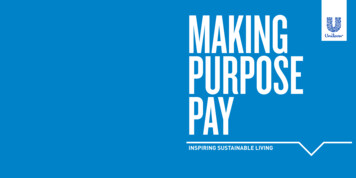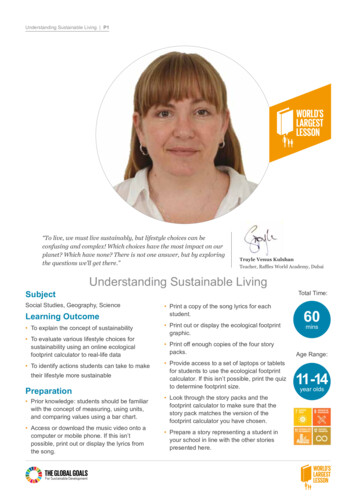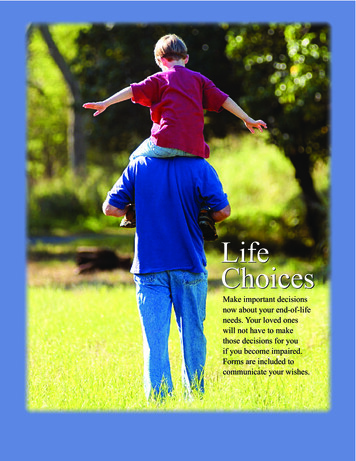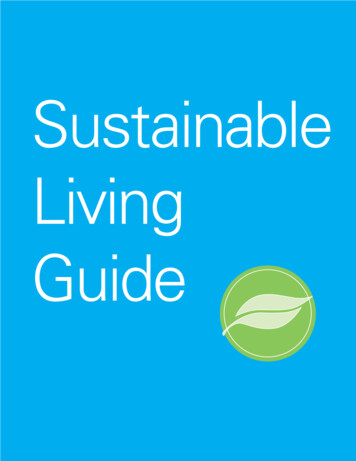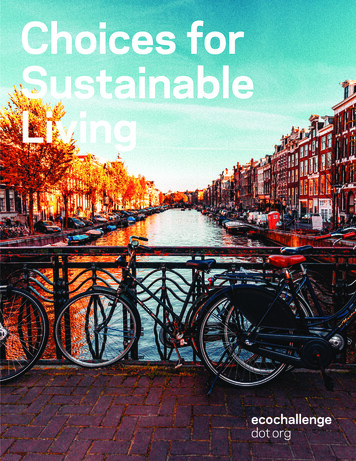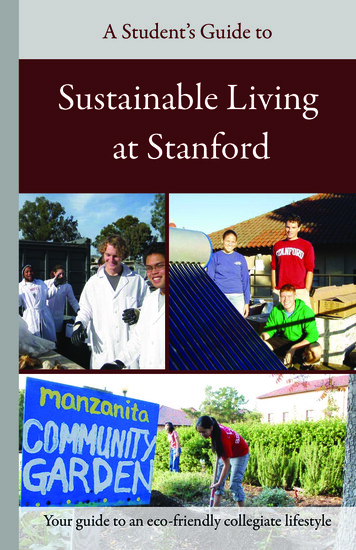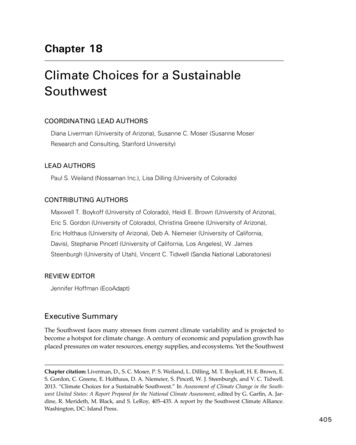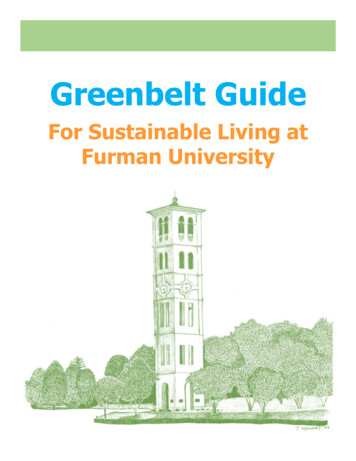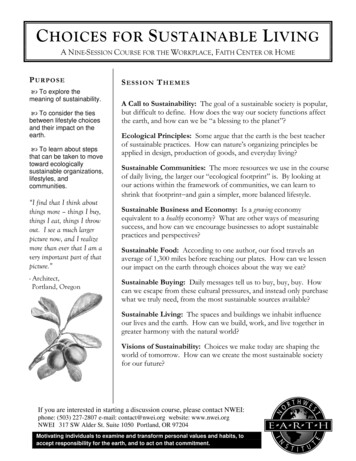
Transcription
C HOICES FOR S USTAINABLE L IVINGA NINE-SESSION COURSE FOR THE WORKPLACE, FAITH CENTER OR HOMEPURPOSEX To explore themeaning of sustainability.X To consider the tiesbetween lifestyle choicesand their impact on theearth.X To learn about stepsthat can be taken to movetoward ecologicallysustainable organizations,lifestyles, andcommunities.“I find that I think aboutthings more – things I buy,things I eat, things I throwout. I see a much largerpicture now, and I realizemore than ever that I am avery important part of thatpicture.”- Architect,Portland, OregonSESSION THEMESA Call to Sustainability: The goal of a sustainable society is popular,but difficult to define. How does the way our society functions affectthe earth, and how can we be “a blessing to the planet”?Ecological Principles: Some argue that the earth is the best teacherof sustainable practices. How can nature’s organizing principles beapplied in design, production of goods, and everyday living?Sustainable Communities: The more resources we use in the courseof daily living, the larger our “ecological footprint” is. By looking atour actions within the framework of communities, we can learn toshrink that footprint and gain a simpler, more balanced lifestyle.Sustainable Business and Economy: Is a growing economyequivalent to a healthy economy? What are other ways of measuringsuccess, and how can we encourage businesses to adopt sustainablepractices and perspectives?Sustainable Food: According to one author, our food travels anaverage of 1,300 miles before reaching our plates. How can we lessenour impact on the earth through choices about the way we eat?Sustainable Buying: Daily messages tell us to buy, buy, buy. Howcan we escape from these cultural pressures, and instead only purchasewhat we truly need, from the most sustainable sources available?Sustainable Living: The spaces and buildings we inhabit influenceour lives and the earth. How can we build, work, and live together ingreater harmony with the natural world?Visions of Sustainability: Choices we make today are shaping theworld of tomorrow. How can we create the most sustainable societyfor our future?If you are interested in starting a discussion course, please contact NWEI:phone: (503) 227-2807 e-mail: contact@nwei.org website: www.nwei.orgNWEI 317 SW Alder St. Suite 1050 Portland, OR 97204Motivating individuals to examine and transform personal values and habits, toaccept responsibility for the earth, and to act on that commitment.
V OLUNTARY S IMPLICITYAN EIGHT-SESSION COURSE FOR THE WORKPLACE, FAITH CENTER OR HOMEPURPOSESESSION THEMES:X To understand themeaning of voluntarysimplicity.The Meaning of Simplicity: The concept of simplicity, as areligious practice or philosophy of life, has a long history. Innersimplicity and outer simplicity are both involved. What are somecommon misconceptions about a simple life?X To explore thematerial andpsychological distractionsthat prevent us fromcaring for the earth.X To consider how lifemight be enriched throughthe practice of simplicity.“The course has given me asense of hope and supportfor a happier, healthier,more balanced life.”- Communicationsconsultant, Portland,OregonLiving More with Less: Accumulating material possessions is partof the American Dream. For some, the dream has become anightmare. When do material possessions add meaning to our livesand when do they detract?Your Money or Your Life: A growing number of people wish toresolve the conflict between the desire to make and spend money andthe desire for a simple life. Why is that so difficult in our culture?Do You Have the Time?: In modern society, our minds arefocused on the "busyness" of the day, our current problems, and ourfuture challenges. Are there alternatives to the fast pace ofmainstream culture?How Much Is Enough?: As a society, we engage in patterns ofmaterial consumption that are damaging the environment. Howmuch do we really need?Swimming Against the Tide: Our country's current guidingeconomic principles push growth, consumption, and technologicaladvance as inextricable and desirable goals. In our efforts to livesimply, we may feel like we are swimming against the tide.The Practice of Simplicity: There are countless practical benefits inmoving toward simplicity. What steps can be taken to move toward alife simple in means, rich in ends?If you are interested in starting a discussion course, please contact NWEI:phone: (503) 227-2807 e-mail: contact@nwei.org website: www.nwei.orgNWEI 317 SW Alder St. Suite 1050 Portland, OR 97204Motivating individuals to examine and transform personal values and habits, toaccept responsibility for the earth, and to act on that commitment.
E XPLORING D EEP E COLOGYA NINE-SESSION COURSE FOR THE WORKPLACE, FAITH CENTER OR HOMEPURPOSEX To clarify earth-relatedvalues through discussionsabout deep ecology andrelated topics.X To discover howpersonal values affect theway we view and treat theearth.X To explore what itmeans to take personalresponsibility for the earth.“I really enjoyed thediscussion style of the course.It was wonderful to heareveryone’s differentviewpoints andopinions The diversitycaused me to think a greatdeal about my own ideasand beliefs and in manycases was inspiring.”- Deep Ecology participantSESSION THEMESDeep Ecology: Human beings are one of many species, everythingis interconnected, and sustainability should replace economic growthas our long-term goal. How do these underlying assumptions differfrom current assumptions of our society?The Gaia Hypothesis: In some ways, the earth functions like aliving organism, maintaining conditions favorable to life. How do thebiological and physical worlds interact to create a self-regulatingprocess?Spirituality and the Earth: Some environmentalists and theologiansemphasize a spiritual dimension in our relationship with the earth.Some believe spirituality is the key to finding motivation to live on asustainable basis with other species and the earth's finite resources.A New Story From Science: Scientific discoveries in physics,biology and cosmology are challenging our assumptions about howthe world works. What do these discoveries teach us about ourrelationship to the earth?Native American Wisdom: Most Americans are far removed fromthe earth in their daily lives. What can be learned from the richheritage of Native Americans and their relationship with MotherEarth?Ecopsychology: Modern life tends to cut us off from our bond tothe natural world. Could restoration of that bond help to heal bothindividuals and the planet?Simplicity: With conveniences of modern life come distractions.What are the benefits and challenges of living a simple life in a societydominated by materialism and technology?Bioregionalism: Each person lives in a unique geographical areawith natural boundaries. Will a deeper understanding of ourbioregion enable us to better care for the earth?If you are interested in starting a discussion course, please contact NWEI:phone: (503) 227-2807 e-mail: contact@nwei.org website: www.nwei.orgNWEI 317 SW Alder St. Suite 1050 Portland, OR 97204Motivating individuals to examine and transform personal values and habits, toaccept responsibility for the earth, and to act on that commitment.
D ISCOVERING A S ENSE OF P LACEAN EIGHT-SESSION COURSE FOR THE WORKPLACE, FAITH CENTER OR HOMEPURPOSESESSION THEMESX To understand themeaning of a bioregionalperspective, and what itwould mean to developone.A Sense of Place: Wendell Berry, America's best-knownbioregionalist, says if you don't know where you are, you don't know who youare. With a sense of place, your identity is defined to a significantextent by the natural features of the place you live. Without a senseof place, what will fill the void?X To consider thebenefits of consciouslydeveloping an intimaterelationship with yourplace.X To explore what itmight mean to protect theplace we live.“I am amazed at theconnections – internal andexternal – I am making asa result of taking thiscourse connecting with theland, with people and withmyself.”- participant,Columbus, OhioResponsibility to Place: There is a difference between living on theland and dwelling in it understanding its rhythms, its potential, and itslimits. Those who develop intimacy with a place over time tend toaccept responsibility for it.Knowing Your Bioregion: Your bioregion is a unique place with itsown watershed, soils, climate, plants, animals, and history. Howmuch do you know about it?Living in Place: Living in place means consciously trying to satisfyyour needs and find your pleasures in your local bioregion andworking to assure the long-term health of the bioregion.Mapping Your Place: Mapping can be learned by local groups andindividuals to give a new sense of place. A typical map showspolitical subdivisions and transportation routes. A bioregional mapdelineates regions based on watersheds, climate, and plant types andhelps people relate to their natural surroundings.Building Local Community: A bioregionalist assumesresponsibility for the health and continuity of a place, not only itsnatural features, but also the social bonds of its people.Empowerment: Knowing a place can inspire and empower one totake action to preserve it or take part in its restoration. Howimportant is individual and group action in modern society?If you are interested in starting a discussion course, please contact NWEI:phone: (503) 227-2807 e-mail: contact@nwei.org website: www.nwei.orgNWEI 317 SW Alder St. Suite 1050 Portland, OR 97204Motivating individuals to examine and transform personal values and habits, toaccept responsibility for the earth, and to act on that commitment.
G LOBALIZATIONAND I TSC RITICSA NINE-SESSION COURSE FOR THE WORKPLACE, FAITH CENTER OR HOMEPURPOSEX To understandthe institutions,processesand effects ofglobalization.X To examinehow personal choicesaffect globalization.X To explore avariety of possiblefuture visionsand how they can becultivated.“The conversationswere amazing.We got deepinto fascinatingissues, and didn’twant to stop. I hadno idea I wouldlearn so much.”- Globalizationcourse participantSESSION THEMESGlobalization Overview: “Globalization” is a term that is frequently used butseldom defined. Since World War II, why has the global economy grown so rapidly?How is it affecting the environment, local economics, and social and cultural customsthroughout the world?Questioning Free Trade: “Free trade” proponents call for the elimination of allbarriers to trade between countries (like tariffs) and for the World TradeOrganization (WTO) to settle all trade disputes. The more exporting and importingthe better. What are the positive and negative impacts of free trade?Transnational Corporations: Globalization encourages the growth of transnationalcorporations that purchase or manufacture goods and sell them around the world.How does this affect workers, consumers, and communities?Food and the Global Marketplace: The local grocery store is now a globalmarketplace. The products travel a great distance, and local growers and processorsmust compete with far away suppliers. What are the long-term consequences?Globalization and the Environment: Some people argue that globalizationdisregards the needs of the natural systems on which it relies. Others believe thatconcern for the environment is not pertinent to trade. What are the implications ofthis latter approach?Social Equity: Proponents say that globalization will “lift all boats.” Critics arguethat the gap between rich and poor is widening and the beneficiaries are the captainsof industry and wealthy investors. Is social equity relevant to trade issues?Shaping Opinion: Corporations seek to shape opinion through techniques that areinvisible to most of us. What are the implications of school curriculum prepared bycorporations, news reports prepared by public relations firms, and “educational”organizations set up by industry groups?08/09/2005Homogenization of Cultures: Free trade, with its attendant introduction ofwestern products and outlets, is changing local cultures throughout the world. Whatis gained and lost through the homogenization of cultures?If you are interested in starting a discussion course, please contact NWEI:phone: (503) 227-2807 e-mail: contact@nwei.org website: www.nwei.orgNWEI 317 SW Alder St. Suite 1050 Portland, OR 97204Motivating individuals to examine and transform personal values and habits, toaccept responsibility for the earth, and to act on that commitment.
H EALTHY C HILDREN – H EALTHY P LANETAN EIGHT-SESSION COURSE FOR THE WORKPLACE, FAITH CENTER OR HOMEPURPOSEX To understand how thepervasive effects ofadvertising, media, and ourconsumer culture caninfluence a child’s view ofthe world.X To discover ways tocreate meaningful familytimes and healthfulenvironments for children.X To explore ways todevelop a child’sconnection to nature, andto foster creativity.“My husband read thereadings also. And for thefirst time in our marriedlife we sat down andtalked about our values.”- Healthy Children – HealthyPlanet course participant.SESSION THEMESCultural Pressures: A powerful fusion of pop culture and peer influencecreates a social smog that has a strong influence on today’s children, saysauthor and doctor Ron Taffel. How should adults respond to thesepressures?Family Rituals and Celebrations: Meaningful family time can provide anantidote to cultural pressures of consumption. Explore how ritual canenrich a child’s family experience and examine alternatives to elaboratecelebrations and gifts.Advertising: The average child sees an estimated 20,000 commercialsevery year. What are the effects on our children, and what steps can adultstake to lessen the impact?Food and Health: Many schools serve high-fat lunches, soda, and candyis readily available on school grounds. What is the link between diet andlearning? How can adults encourage children to include healthy foods intheir meals?Time and Creativity: Today’s children may have schedules that rival thebusiest adults. How can adults help children find balance between activitiesand unstructured time, which is often the source of creativity?Technology and the Media: Opinions differ on whether computershinder or help the natural process of child development. Watching TV candisplace more valuable experiences. What steps can adults take to create ahealthy media environment at home?Exploring Nature: Children have an affinity for the natural world and asRachel Carson says, “an inborn sense of wonder.” As children spend moretime indoors, they connect less to the wild places in their neighborhood.How can we give children the opportunity to connect with the naturalworld?For more information contact:Northwest Earth Institute, 317 Alder, Suite 1050 Portland, OR 97204(503) 227-2807, contact@nwei.org, www.nwei.orgMotivating individuals to examine and transform personal values and habits,to accept responsibility for the earth, and to act on that commitment.7/05
Motivating individuals to examine and transform personal values and habits,To accept responsibility for the earth, and to act on that commitmentC OURSE B OOK O RDER F ORMDateYES! I would like to order course books and introductory materials.They will be used in discussion groups, ideally with eight to twelve people (min of 6, max of 14).Name/Org.Address (Not a PO Box)City State ZipDaytime phone () Home phone (mail address Fax () E-)Class Location (check one)homeworkplacefaith centerother:Class Start Date Three Week Delivery Eight Business Days DeliveryDeep Ecology @ 15 eachVoluntary Simplicity @ 15 eachChoices for Sus Living @ 15 eachDiscovering Sense of Place @ 15 eachGlobalization and Its Critics @ 15 eachHealthy Children @ 15 eachGuide for the Local Organizer**Required if this is your first course.Shipping and handling chargesNWEI Membership: Starts at 35 **Donation to National Network **Total 3.00 Shipping/HandlingThree week deliveryunder 13 books 15.0013-30 books 22.0031-60 books 31.00Eight business days deliveryunder 13 books 25.0013-30 books 40.0031-60 books 70.00** Optional - Become a member or just show support and receive our quarterly newsletter, EarthMatters.NWEI NEEDS PAYMENT PRIOR TO SENDING OUT COURSE BOOKS.If you have questions or need assistance, please call. Phone: (503) 227-2807; Fax: (503) 227-2917Send order form and credit card information or check payable to:“NWEI” / Attn: National Outreach Coordinator / 317 SW Alder Street, Suite 1050/ Portland, OR 97204Visa/Mastercard # - - - Expiration dateName as it appears on credit cardI understand that course books and related materials developed by NWEI can only be used in connection with course offerings andcannot be distributed individually to those who do not take an NWEI course. In addition, I will not charge participants a fee forparticipation in the course, nor will I charge more for the course books than the actual cost of 15 plus a share of the shipping andhandling costs listed.The Northwest Earth Institute appreciates your efforts to offer courses in your community.Office Use Only: Faxedupdated 8/9/2005
CHOICES FOR SUSTAINABLE LIVING A N INE-SESSION COURSE FOR THE WORKPLACE, FAITH ENTER OR HOME PURPOSE X To explore the meaning of sustainability. X To consider the ties between lifestyle choi
